The January 6 Hearings Didn’t Change Entrenched Opinion
Can American democracy survive its information bubbles?
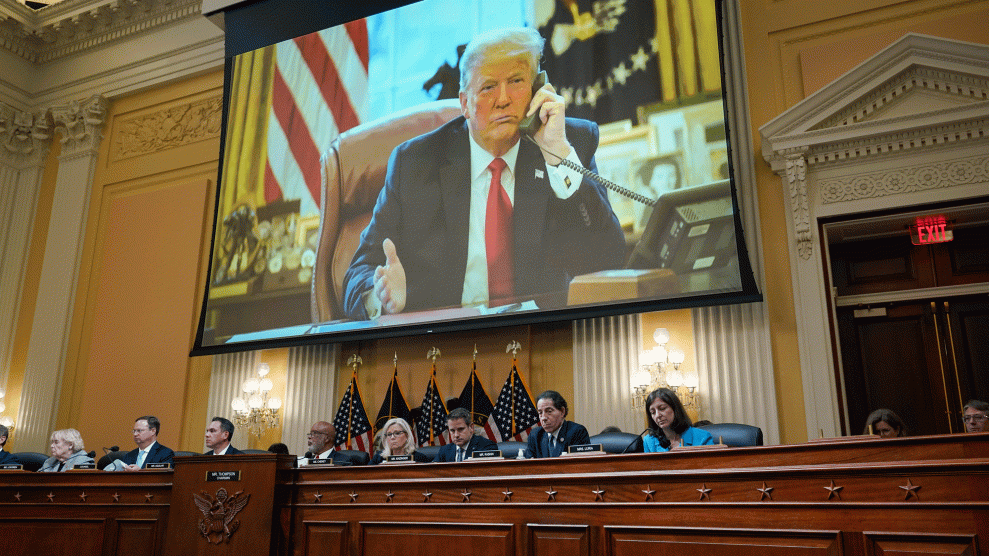
CNN polling director Jennifer Agiesta (“CNN Poll: January 6 hearings haven’t changed opinions much, but most agree Trump acted unethically“):
After the eight public hearings held by the House Select Committee investigating the January 6, 2021, attack on the US Capitol, the American public’s views on the state of democracy and the threat posed to it by that event have changed little, according to a new CNN poll conducted by SSRS.
At the same time, a public consensus has emerged that former President Donald Trump acted at least unethically in trying to hold on to his office after the 2020 election (79% feel he acted either unethically or illegally, including 45% who believe his actions were illegal), that he encouraged political violence in his public statements ahead of January 6 (61%) and that he could have done more to stop the attack once it had begun (77%).
This is quite the paradox: an overwhelming 4 in 5 Americans think Trump is unethical and nearly half think he’s a straight-up criminal. But that’s essentially the status quo ante so the committee didn’t change minds.
All told, the poll finds that 69% of Americans consider the January 6 attack to be a crisis or major problem for American democracy. That’s up slightly since earlier this year, when 65% said the same. More broadly, 54% say they see American democracy as under attack, about the same as the 52% who felt that way earlier this year.
The movement is within the margin of sampling error—which is to say, the poll actually measures no meaningful movement. But, again, that’s because the baseline was pretty high to begin with.
Here’s where it gets sticky:
Although there was little movement on each of these questions, partisans appear to be moving in opposite directions. While Democrats are becoming more likely to say democracy is under attack (55% now, up from 46% earlier this year) and that the January 6 attack is a major problem or a crisis (96% now, up from 91%), Republicans are now less likely to feel that way than earlier this year, before the select committee’s hearings. Just 36% of Republicans now say that January 6 was a crisis or major problem, down 7 points since February, and 54% feel American democracy is under attack, down from 66% earlier this year.
Partly, I suspect, it’s because most people who truly despise Trump have stopped identifying as Republican. Mostly, though, it’s a function of information bubbles: Republicans and Democrats are not watching or reading the same news sources. Indeed, it wouldn’t surprise me in the least if a substantial number of the Republicans who “feel American democracy is under attack” feel that the attack is coming from the Democrats.
Roughly 4 in 10 overall have been closely following news about the select committee’s hearings (41%), with attention concentrated among Democrats (55% of Democrats are following at least somewhat closely, compared with 40% of independents and 28% of Republicans).
I suspect a lot of people are lying here, or at least using a much looser definition of “closely following the news” than I would. Still, it stands to reason that Democrats are more interested, since it’s a case against a hated opponent.
About half of all adults say they think the investigation the committee has carried out has been a fair attempt to determine what happened (47%), while 34% say it’s been a one-sided effort to blame Trump, the rest feel they haven’t heard enough to say. Those figures are largely unmoved compared with polling earlier this year.
Those numbers track almost exactly with the party breakdown of the pol.
Most (60%) doubt that the committee’s work will result in changes that help protect American democracy. Democrats are the most optimistic here, 65% think it will lead to meaningful change, compared with just 37% of independents and 17% of Republicans.
I suppose “meaningful change” is subjective but the Democrats are way too optimistic. There’s essentially zero chance anything beyond some mild reforms of the 19th Century legislation on how the Electoral vote is counted comes out of this.
Although there are divisions by party in how Americans view Trump’s behavior around January 6, majorities across party lines agree that his conduct in trying to remain in office was at least unethical and that he could have done more to stop the attack. Nearly all Democrats (97%) and a broad majority of independents (83%) say Trump acted unethically or illegally in trying to remain in office, but so too do a majority of Republicans (55%). And likewise, 55% of Republicans say Trump could have done more to stop the attack once it began. Eight in 10 independents (81%) and 93% of Democrats say the same.
I suppose it’s something that a majority of Republicans at least acknowledge that Trump could have done more. And a bit curious that exactly the same number say that he was unethical.
Asked whether then-Vice President Mike Pence or Trump did more to act in the best interests of the country on January 6, most Americans (67%), including broad majorities of Democrats (91%) and independents (64%), say Pence had the nation’s interests more at heart. Republicans split on the question, however, with 52% saying Trump did more to protect the country’s interests and 46% saying Pence did.
This is just looney tunes. We have 55% of Republicans who thought Trump could have done more—but they still give him more credit than Pence!
And Republicans do not agree that Trump’s statements leading up to January 6 encouraged political violence. About 8 in 10 Republicans (79%) say Trump’s statements did not encourage violence, while 66% of independents and 94% of Democrats say they did.
Again, this is just fantasy land. I still believe it’s an open question as to whether prosecutors have a strong enough case for criminal incitement to risk bringing it against a former President. But that his statements “encouraged violence” is simply not in dispute. We have open testimony from rioters, including Proud Boys, that they were encouraged by Trump’s statements.
Most disheartening:
That said, a broad majority continue to reject the falsehood that the 2020 election was stolen: 69%, a new high in CNN’s polling, say that Biden legitimately won enough votes to win the presidency in 2020. Still, most Republicans continue to say that Biden’s win was not legitimate (66%).
Republicans and Republican-leaning independents are more likely to say that the GOP should be accepting of candidates who believe the 2020 election was stolen (72% say it should be at least somewhat accepting of those candidates) than they are to say that the party should be accepting of those who say the election was legitimate (63% say so). Combined, 30% say the party should only be accepting of candidates who say the election was stolen, 22% only those who think it was legitimate, and 42% say the party should accept a mix of both.
There are broad divides on these questions between those Republicans who want Trump to be the party’s nominee in 2024 and those who do not. Among those who say Republicans ought to nominate someone else, there’s wide acceptance of those of all perspectives on 2020: 79% say the party should be accepting of candidates who believe the election was legitimate and 62% say it should be accepting of those who believe it was stolen. Trump’s backers within the party, though, mostly say to accept those candidates who think the election was stolen (86%) and not accept those who think it was legitimate (57%).
I don’t know how you can run a democracy (or, if you prefer, a Republic) with this level of disconnect. We have roughly 30 percent of the voting public that’s simply delusional.
Still, a majority of Republican and Republican-leaning registered voters now say they do not want Trump to be their party’s presidential nominee in 2024 (55% say they want a different candidate), a slight shift away from Trump compared with earlier this year (49% preferred someone other than Trump in a poll conducted in January and February). An increasing number say they feel that way primarily because they just don’t want him to be president (27% now, up from 19% earlier this year).
Agiesta makes the point that immediately popped into my point reading that paragraph:
Trump’s standing among Republican-aligned voters in advance of the 2024 campaign, though, is not as perilous as President Joe Biden’s position among his partisans. The new poll finds three-quarters of Democratic and Democratic-leaning voters (75%) want the party to nominate someone else in 2024, a sharp increase from 51% earlier this year.
Granted, there is always going to be a cohort of Democrats, an inherently more divided coalition, who want someone else. Still, it’s simply depressing that Biden, a decent man doing his best under trying circumstances, is more unpopular with his partisans than is Trump—a man whom 55% of the same sample believe to be unethical.
Thinking more generally about 2024, the poll finds that most Americans (57%) express at least some confidence that the nation’s democracy would be able to withstand a losing presidential candidate’s attempt to overturn the election results in 2024, but that confidence is tepid. Just 19% say they are very confident that US democracy could survive such an effort, with confidence stronger among Republicans (26% very confident vs. 17% among Democrats). In overall confidence, younger Americans are notably skeptical about US democracy’s ability to withstand an attempt to overturn the results of the 2024 presidential contest: While 63% of those age 45 or older express at least some confidence, only 49% of those under age 45 agree.
While I am decidedly in the over-45 category, my analysis is in line with the youth. While I think we’ll get the country back on track eventually—simply on the basis that we always have in the past—I haven’t the foggiest idea how.
Yesterday’s episode of the Ezra Klein Show, “How We Communicate Will Decide Whether Democracy Lives or Dies,” features an insightful conversation with Sean Illing, a political science PhD turned journalist, on his new book (with Zac Gershberg), The Paradox of Democracy. I’ll blog about it in depth in the unlikely event I have the time but its premise is an extension of Marshal McLuhan’s famous line, “the medium is the message.” Just as television and its visually radically transformed our politics, so is social media.
We’re trying to think of democracy as a communitive culture. We think of democracy as a decision to open up the public sphere and let people speak, think and decide what ought to be done. So in that sense, it is a culture of open communication. And thinking of it as a culture rather than a constellation of practices or institutions is not a pedantic or academic thing.
We’re trying to emphasize the open-endedness of it, the fact that it’s always in a state of becoming. And the fact that you can say that a state is Democratic and the fact that doesn’t necessarily tell you how it’s governed is pretty instructive, right?
I mean, it’s not for nothing that fascism has only ever emerged out of Democratic societies.
There’s something about the collision of mass media and mass politics that made fascism possible. If fascism can emerge out of a Democratic society, anything can. And I just think when you talk about this tendency to conflate liberalism and democracy obscures the fact that democracy really is an unwieldy thing. And without something like liberalism to check some of its excesses, it can spin in very unpredictable directions. And there are all kinds of examples of that throughout history and even today.
[…]
[T}he fact that the very thing that makes democracy possible, which is wide open, free expression that while that’s a condition of democracy, it can also be hijacked and turned against it. And that’s what fascism is. So the thing that makes it possible is also the thing that threatens it from within.
And that tension or that paradox is baked into the structure of democracy if you see it in that way. There’s just no transcending that, right?
If you’re going to open up society, then you’re opening the culture up to all manner of persuasion, all manner of rhetoric, the inspirational leaders and the bullshit artists and the demagogues and any other manner of bad faith actor you can imagine. It is a free-for-all in that way. And so that’s just what it is. And that’s what makes it, I think, a paradox. You just simply cannot get out of it. The very thing that makes it possible is also the thing that perpetually threatens it. And in that sense, democracy is just sort of situated on a precipice, always.
How we get off the ledge and back to a community where communication transcends opposing ideological bubbles, I haven’t a clue.

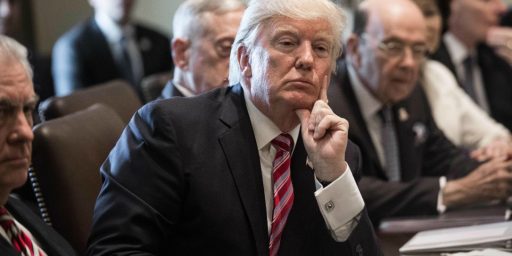
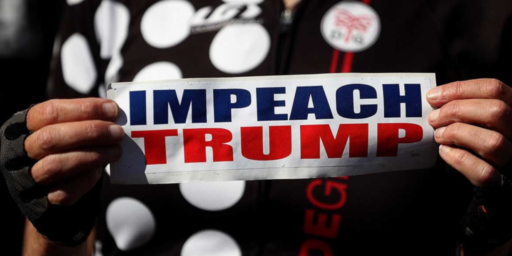
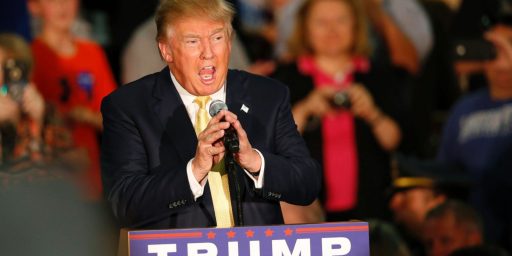
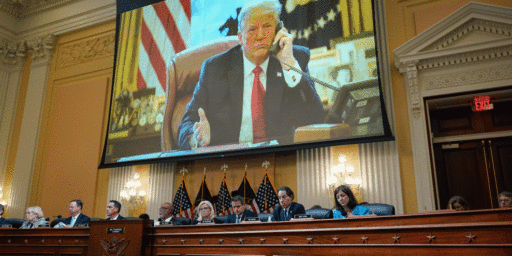
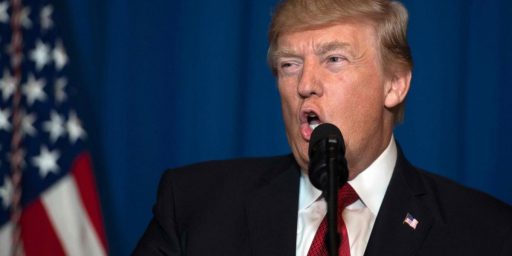
I don’t think these polls are particularly useful, as they give too much weight to the mushy 70% in the middle. These are going to be heavily influenced by the 10-20% at either extreme. If we start out with 15% actively Trumpian, 15% anti-Trump and 70% in that middle ground, we are effectively split. But if 2-3% of the active trumpers become disillusioned enough to disengage, that’s actually a significant movement, but with this type of poll that’s just noise.
Christopher Miller, Trump’s acting secretary of defense, told Sean Hannity one thing, and the Jan. 6 committee quite another.
http://www.thebulwark.com/trumps-jan-6th-national-guard-lie-crumbles/
I bookmarked that Sean Illing interview last night intending to comment on it this morning. Very much worth reading. I’ve liked Illing’s interviews at VOX. He does his homework and sympathetically digs out his subjects views. I think I’ve linked to them a couple times here.
In anticipation of your post, I’ll confine myself to noting that I’ve felt modern politics has become very performative. Not just a reality show president, but people taking selfies of themselves committing crimes at the Capitol, some of the woke excesses, the Boeberts of the world, and I think the neo-Nazis are more about parading around in cammo with ARs than actual white nationalism. I think Illing would say of course it’s performative, they all grew up in the television era. But it’s also the social media era, so it’s not intended to convince, or to make the participants look good, but to trigger engagement.
It’s not about information bubbles, it’s about the brains of the people who may or may not be parsing the information they receive. Facts are simply obstacles to religious nuts – cult members. The more facts they have to ‘overcome’ the stronger their faith.
Stop imagining that these people are capable of rational thought. They aren’t. They never were. They were always stupid, faith-driven ninnies. They conflated Jesus and Trump and moved him out of their politics brain into their religion brain. One of the features of intelligence is the ability to adjust to new data. These are not intelligent people.
It’s nonsense to say the committee has changed things. Trump was absolutely going to be the GOP nominee, and now that is unlikely.
@Michael Reynolds:
Did you mean to say that “it’s nonsense to think that the committee hasn’t changed things”?
@Michael Reynolds: We all tend to see other people as like ourselves, but you’re right, they aren’t. Right off the top, we take an obsessive interest in politics and most people, quite sensibly, don’t. And most of us here, whether formally or through our own efforts, have a decently broad education and some idea of history, econ, literature, etc.
But I think it goes beyond that. The idea of language is that words are symbols for things and we make logical connections between the symbols. I swear a lot of people just make emotional connections between words. “I feel good about tax cuts. I feel good about deficit reduction. So they’re basically the same.” I’d add that for most of us here a fact, like this post’s subject, the 1/6 riot, sits in a web of antecedents and subsequents with contingencies and probabilities. For many people it seems to just sit there by itself. “Some people say Trump did it. Other people say it was the FBI. Others that it was a peaceful protest. Who’s to say which is right?” Hannah Arendt’s line about believing everything and nothing.
Stalin ordered the Great Purge in the late 30s, largely to rid himself of rivals and enemies. But it also included mass executions of all sorts of ordinary people at all levels.
After two years of this terror, Stalin blamed the mass executions and arrests, torture, etc. on the two men he had tasked with carrying them out.
Stalin controlled what information reached the public and how it did so. He also remained popular through his reign. The math pretty much does itself.
@CSK: I worry if I see I made a typo in a comment. I console myself with the realization that most people will read right through it without noticing, as I did with Michael’s sentence.
I’ll add that I doubt the 1/6 hearings of and by themselves will change opinion very much. But they’ve made it impossible for any but the most biased journalists to pretend 1/6 was anything but what it was. And added recognition that it wasn’t a stand alone that just happened, that it was just a part of a wider plot. Over time that will change opinion.
A stupid plot with no chance of success, at least when hastily put together for the first try. But as I’ve argued in other circumstances, failure of a plot is not evidence of absence of the plot.
@CSK:
Yep. I don’t know if anyone else has ever mentioned this but EDIT FUNCTION!
“it’s nonsense to think that the committee hasn’t changed things”
Nonsense! Who votes in primaries? If he wants it the nomination is his. (I still live and work, often, in Trump land. He is still God to them.)
Steve
@steve:
I know.
Back at the start of the hearings, I asked you why the hearings were important in light of the fact that most people were not likely to significantly change their opinions about Jan. 6 or even watch the hearings at all. You answered “for history” as the reason.
I mumbled to myself that I had no reason to suspect that history was going to get this wrong–at least I think I mumbled it to myself. It would seem that your goal has been met. What else could you expect?
We are missing a bombshell that even the die hard Trumpers cannot ignore. The information is there, but the television moment isn’t.
There have been good moments, but nothing that cuts through years of propaganda.
I think our democracy would likely be safer and more secure if the angry mobs had gotten their hands on Pence or a few congress critters.
@Gustopher:
What do you think Trump’s reaction would have been if Mike Pence had been hanged? Or a bullet had been put through Nancy Pelosi’s brain?
ETA: Maybe two reactions: public and private.
@Michael Reynolds:
Dude, rational thought is hard. And it’s slow. Way slower than the emotional responses that cut it off.
It has to be learned. From being able to remember what you know and what you assume, to filtering information, to the logical structures… none of this is the normal human state.
How many logical fallacies are there? In early comp-sci and engineering classes you can see kids struggling with “if A implies B, does that mean B implies A?*” — and these are people who are more inclined to think this way.
Logical fallacies look like logic — emotionally they read like logic, and emotional thinking is way faster than rational thinking and usually shuts off rational thought.
It’s not religion and faith, it’s that we’re semi-evolved monkeys and our stupid little monkey brains aren’t built for this.
And then we have propaganda that employs logical fallacies instead of logic and triggers emotional reactions.
It’s not “these people”, it’s just “people.”
Put an Atheist in front of Fox for a year and they will be ranting about Hunter Biden’s laptop that was used to steal the election.
——
*: Trivial example: Richard Nixon is a Republican. If you know someone is Richard Nixon, you know that they are a Republican. If you know someone is Republican, do you know that they are Richard Nixon? (Other examples are way harder to see, and if you add in statistics… now we’re into a space where basically no one can follow without a lot of effort)
@CSK: Trump would have been delighted. But what would the public’s reaction be?
Ultimately our government functions with the grudging-consent of the governed, and that puts limits on it. You’re willing to accept small horrors, but not big ones.
People can gloss over the insurrection because nothing happened — it failed and no one they know about that hurt, so what’s the big deal.
Get a few heads rolling into baskets, and that changes. I’m optimistic enough to think it would change for the better.
@Gustopher:
Oh, I’m sure Trump would have been delighted in private. But what about his public reaction?
The attraction to and accumulation of power by way of oppressing others doesn’t care about facts and truth.
@Gustopher:
I have no doubt whatsoever that there are atheists saying that very thing right at this moment somewhere in this Greatest of all Nations on God’s Green Earth. But Michael has his particular faith to support and I will respect his beliefs because I should treat the faith of others the same way I would hope my faith would be treated.
Michael clearly does not agree with my ethos, but that doesn’t excuse me from it.
A highly recognized clinical psychologist once told me “You won’t ever be much of a psychologist if you think in terms of personalities. What you need to think about is habits and strategies, and obstacles and opportunities”.
I think that’s important in understanding how/when people change political views, which we know isn’t fast.
I also find it valuable to recognize that if we want to win someone over, we aren’t just taking them out of their viewpoint – as “cultish” as it might seem to us – we’re taking them into our own worldview.
In any case, I’m not super friendly to the view that they are just different. They are different, but those differences exist for reasons. Those reasons could have happened to me, but they didn’t. And yes, I do think my choices mattered – there’s a complex interplay there.
I recall a case of such negative virtue-signalling in the Obama birth cert fiasco. No matter how much evidence was produced the cultists responded to polls by saying it was false…to do otherwise would be a disavowal of membership…but they knew the truth. Focus groups produce similar distortions.
@Gustopher:
Well,
it’s easy to talk about rationality.It’s easy to generalize about rationality.I’m stepping in some shit here, but pick the rational statement out of these four:
There is no God.
There is one God.
There are many Gods.
I don’t know.
But there are many people, including some regulars here, who would die before admitting that there is only one truly correct answer [ETA: in terms of rationality]. They are also likely to insist they arrived at the incorrect one through rational thought.
(Yes, I recognize this is sort of a cheap, obtuse example.)
Your point about fallacies is on the money. “Ad hom” gets thrown around willy nilly even when one or more exceptions apply.
A little knowledge can be more dangerous than none at all.
How does one judge rationality in the context of a complex world?
AGW: as far as I know, there is not a single climate scientist among the regulars here. But there is likely a consensus wrt to AGW among us, no?
Did any of us painstakingly pick through the data? Unlikely. But given this group, at least one of us has likely done quite a bit of intensive research into it. Even then, it still requires expertise across several disciplines to fully grasp it. And more importantly, it takes well developed expertise to check the work.
No, each one of us used a series of heuristics to arrive at our conclusion. But like fallacies, the quality and application of those heuristics can be difficult to judge.
But some of us are much better at and more comfortable than others recognizing our individual limitations.
@Kurtz:
I’m pretty hardcore atheist, but I have a different formulation: the burden of proof for god has not been met. In the absence of any evidence I have no choice but to disbelieve in exactly the same way that I don’t believe in unicorns. Can I say ‘I don’t know for sure?’ Okay. But it’s no different than saying, ‘I don’t know for sure if leprechauns exist,’ but it’s going to be accompanied by an eye roll.